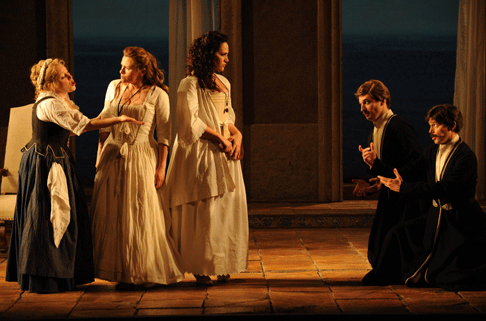The staging is an import from Aix-en-Provence, so did at least exist fully-fledged to begin with, but it was nonetheless a major blow to both Kiarostami and ENO that he could not be there to oversee its London revival.
Unlike some other recent opera productions by film directors one may mention, his dÈbut does not look or feel especially cinematic. Yes, there are complex animated video projections which provide the backdrop for the majority of the opera, but these seem quite separate from the live action on stage — or rather they seem to add little to the directorial interpretation of the opera as a theatrical piece. The vast calm sea projection looks lovely, but when in the second scene a little red-sailed boat heads slowly across the bay (to collect Ferrando and Guglielmo) it succeeds only in drawing the eye towards it for the entire duration of the scene, detracting attention from the singers. A projected on-stage orchestra for the wedding scene is entertaining at first, but it remains there for the whole of the final scene, and becomes annoying to watch once the real conductor’s beat has drifted slightly out of synch with it.
Otherwise the staging is an entirely conventional and old-fashioned one, disappointingly bypassing any attempt to deal with the opera’s difficult issues surrounding human nature, betrayal, and sexual double-standards. Without the projections (and some really lovely lighting by Jean Kalman) there would have been little else to distinguish this staging from one you might see from a run-of-the-mill touring company in a suburban town hall.
Of course it is highly unlikely that such a town-hall setting would boast two such classy performances as came from the evening’s soprano soloists. First, Fiordiligi: on the evidence of Susan Gritton’s performance of the same role in the previous ENO production, she wasn’t quite in her best voice on this occasion, and remains not entirely comfortable in the lower depths of the role’s enormous vocal range – but she is grippingly passionate, involving, and always intelligent. The other star turn came from young Sophie Bevan, whose confident, spunky Despina was a real highlight, using her diminutive figure to great comic effect in her guises as doctor and lawyer, and singing outstandingly well.
Stephen Page’s incisive and eloquent Don Alfonso easily dominated the two male leads, neither of whom left much of a dramatic mark, and to be honest it was tricky to see quite what the girls saw in them. At least the American baritone Liam Bonner was a vocally attractive and secure Guglielmo, but Canadian tenor Thomas Glenn was lightweight for Ferrando in such a large house, and sang untidily. Mezzo Fiona Murphy, vivacious and sassy as Valencienne in *The Merry Widow* and Lola in *Cavalleria Rusticana*, was an warm-voiced but unaccountably characterless Dorabella, and with indifferent diction too.
 Sophie Bevan (Despina), Susan Gritton (Fiordiligi), Fiona Murphy (Dorabella), Liam Bonner (Guglielmo) and Thomas Glenn (Ferrando)
Sophie Bevan (Despina), Susan Gritton (Fiordiligi), Fiona Murphy (Dorabella), Liam Bonner (Guglielmo) and Thomas Glenn (Ferrando)
The young Swedish conductor Stefan Kingele kept everything brisk and energetic right from the start; the tempo change into the fast section of the overture was brought forward a few bars, so that the second half of the *CosÏ fan tutte* motif was already charging along at the new pace. He had less success in maintaining a tight ensemble between pit and stage; there were far too many partings of the ways.
The production makes the ending simplistic to the point of nonsense, without any apparent exploration of how the couples’ feelings towards one another may have changed, developed, or turned on their head as a result of the little experiment. None of them seem, ultimately, to have been remotely challenged by it. We are left wondering why Don Alfonso bothered.
Ruth Elleson © 2009
image=http://www.operatoday.com/cosi_fan_tutte004.gif
image_description=Fiona Murphy (Dorabella), Thomas Glenn (Ferrando) and Steven Page (Don Alfonso) [Photo by Stephen Cummiskey]
product=yes
product_title=W. A. Mozart: CosÏ fan tutte
product_by=Fiordiligi: Susan Gritton; Dorabella: Fiona Murphy; Ferrando: Thomas Glenn; Guglielmo: Liam Bonner; Don Alfonso: Steven Page; Despina: Sophie Bevan. Conductor: Stefan Klingele. Director: Elaine Tyler-Hall. Designer: Malika Chaveau. Lighting Designer: Jean Kalman.
product_id=Above: Fiona Murphy (Dorabella), Thomas Glenn (Ferrando) and Steven Page (Don Alfonso) [Photos by Stephen Cummiskey]